|
|
|
Sort Order |
|
|
|
Items / Page
|
|
|
|
|
|
|
| Srl | Item |
| 1 |
ID:
121814
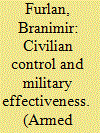

|
|
|
|
|
| Publication |
2013.
|
| Summary/Abstract |
This article gives an overview of how civilian control of the military in Slovenia is implemented in practice. It utilizes the perspective of the controlled entity itself, that is, the Slovenian Armed Forces. The findings show the type and characteristics of civilian control in Slovenia and how they hinder military effectiveness. As one of the European transition countries to have concluded the democratization of its civil-military relations, civilian control over Slovenia's Armed Forces is now in place; however, the control mechanisms have had several debilitating effects on the country's armed forces-the democratization of civil-military relations has been achieved at the partial expense of military effectiveness. Because of this experience, the Slovenian case could serve as an example of how successful democratization of civil-military relations can sometimes produce negative outcomes, or collateral damage, for the military, especially when the employers of the control mechanisms are not aware of the effects that the exercise of their control might have on the military's ability to execute core missions. Methodologically, this article brings an approach for analyzing interrelations between civilian control and military effectiveness.
|
|
|
|
|
|
|
|
|
|
|
|
|
|
|
|
| 2 |
ID:
140767


|
|
|
|
|
| Summary/Abstract |
The role of small states in international relations, aspiring to enter into international society as a credible actor, is often measured through their contribution to international security. Slovenia, as a small state, has presumed its ‘well-deserved place’ in the international community could be reached by becoming a trustworthy member of NATO. Among other things, this has meant aligning state policies with those of the political-military organization and so becoming a ‘like-minded’ member of the prestigious club. One of the steps Slovenia has done in this regard was the deployment of its civilian experts to the NATO-led missions to Kosovo and Afghanistan; they were integrated into the contingents of the Slovenian Armed Forces. With this, Slovenian civil-military cooperation in conflict and post-conflict areas has begun, following NATO’s request to contribute not only armed forces but also civilian experts. This article analyzes the development of civil-military cooperation in Slovenia and explores how has it evolved from relatively poorly planned and unorganized attempts to a more structured and better coordinated ‘business’ of a small state in fragile societies. The relationship between the Slovenian military and Slovenian civilian experts from the perspective of ‘being forced to work together’ within the stabilization efforts in Kosovo and Afghanistan is the main focus of this article. The article’s findings, built on interviewing and surveying of Slovenian military commanders and civilian experts, are relevant for a better understanding of small states’ behavior in international relations and military sociology in conflict and post-conflict zones.
|
|
|
|
|
|
|
|
|
|
|
|
|
|
|
|
| 3 |
ID:
160991
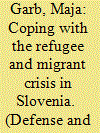

|
|
|
|
|
| Summary/Abstract |
Approximately 470,000 refugees and migrants passed through Slovenian territory between September 2015 and March 2016, creating a crisis that required a great deal of organisational and field work on the part of many governmental and non-governmental institutions. In the social sciences, a discourse on “security versus humanitarian approach” on the refugees and migrant issue appeared; however, the article goes over such a discourse and deals with roles and problems of different institutions – mostly the military – that responded to the crisis. Namely, coping with the crisis was characterised by significant institutional adjustments, difficult co-ordination, and intense public debate. The Slovenian Armed Forces were included in this process as support for Civil Protection and Police. The military’s role followed the military missions defined by the Defence Act; however, the government also proposed some changes to the act that were met with some doubts on the part of the public and different institutions.
|
|
|
|
|
|
|
|
|
|
|
|
|
|
|
|
| 4 |
ID:
100024
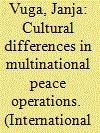

|
|
|
|
|
| Publication |
2010.
|
| Summary/Abstract |
The article is based on research conducted at the Defence Research Centre, emphasizing the qualitative data gathering conducted among members of the Slovenian Armed Forces (SAF) in the UN Interim Force in Lebanon (UNIFIL II) mission in 2007-09. Complex peace operations, as opposed to traditional ones, require a multinational structure and cooperation with several non-military actors/subjects. Trying to be effective, doing the job as well as possible and surviving the situation of living in a limited area with formal and informal interaction with a small number of people takes well-defined rules and procedures as well as the awareness of the importance of integrating mechanisms. Culture, encompassing the military organizational culture as well as the so-called 'national culture', undeniably has a substantial impact on the relations within a given multinational operation. Within the cultural framework, the common language or lingua franca deserves special attention.
|
|
|
|
|
|
|
|
|
|
|
|
|
|
|
|
| 5 |
ID:
137629
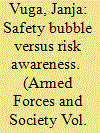

|
|
|
|
|
| Summary/Abstract |
The acceptance of risk in a certain society is tested when de facto or merely potential military death casualties are raised. Several dimensions influencing the acceptability of risk have already been analyzed, although only three are examined in this article—namely, the historicopolitical, sociodemographic, and cultural. The Slovenian public opinion survey persistently shows strong risk aversion among Slovenians and the article’s purpose is therefore to (1) establish how can the strong risk aversion be explained by the selected dimensions; and (2) identify what part of the population is most risk-aversive. To that end, over twenty years of Slovenian public poll data are analyzed using a triangulation of statistical methods, revealing a cultural pattern of safety bubble versus risk awareness. As the risk aversion model reveals, Slovenian society represents a safety bubble, with strong risk aversion and a very narrow selection of activities worth making sacrifices for. Death casualties are rarely accepted, even if incurred in support of ideals society strongly appreciates, like humanitarian causes.
|
|
|
|
|
|
|
|
|
|
|
|
|
|
|
|
| 6 |
ID:
164578
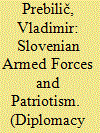

|
|
|
|
|
| Summary/Abstract |
Patriotism needs understanding as a positive feeling that in its narrowest sense determines the relationship towards one’s country as basic living space of family members and, at the same time, represents the foundation for a variety of actions by individuals. A high level of patriotism amongst members of a state’s security system who are consequently providers of national safety is to be expected, and the members of the armed forces have perhaps the highest level of patriotism. Since its beginnings in June 1991, the Slovenian Armed Forces have been going through various reform processes and transformations. These developments have included changes in staffing the armed forces and a simultaneous constant reduction of the defence budget, both of which undoubtedly affect the satisfaction of each service member about their attitude towards the motherland and the system to which the service belongs. This analysis offers the results of a study of the members of the Slovenian Armed Forces that, first, identifies the level of patriotism amongst those members and, second, establishes their attitudes towards patriotism.
|
|
|
|
|
|
|
|
|
|
|
|
|
|
|
|
| 7 |
ID:
101817
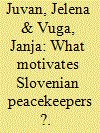

|
|
|
|
|
| Publication |
2011.
|
| Summary/Abstract |
This article is based on the results of longitudinal research on the motivations and expectations of members of the Slovenian Armed Forces participating in peace operations from 2003 to 2009. The analysis is based on three main approaches. The first is to distinguish between two groups of soldiers: those deployed to missions abroad on a voluntary basis, and those deployed to missions by order. The second approach is to distinguish between those deployed for the first time, and those who have already participated in peace support operations (PSOs) before. The third approach aims at distinguishing between three types of soldiers' motivation for PSOs according to Battistelli's typology. The importance of the different groups of motivation would to a certain degree also vary depending on the national culture, organizational culture and the individual soldier, as well as the time at which the survey was conducted: prior to deployment, during deployment or after returning home.
|
|
|
|
|
|
|
|
|
|
|
|
|
|
|
|
|
|
|
|
|